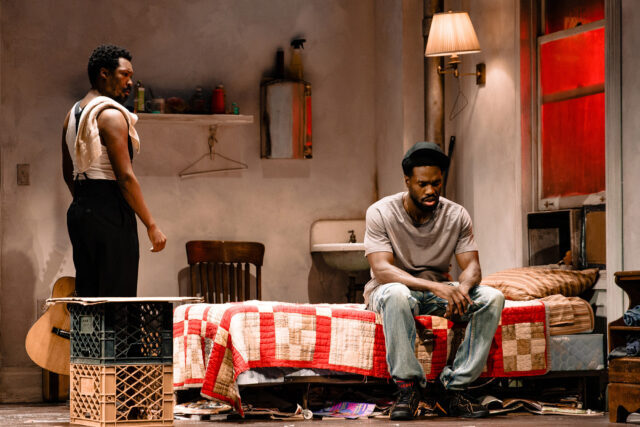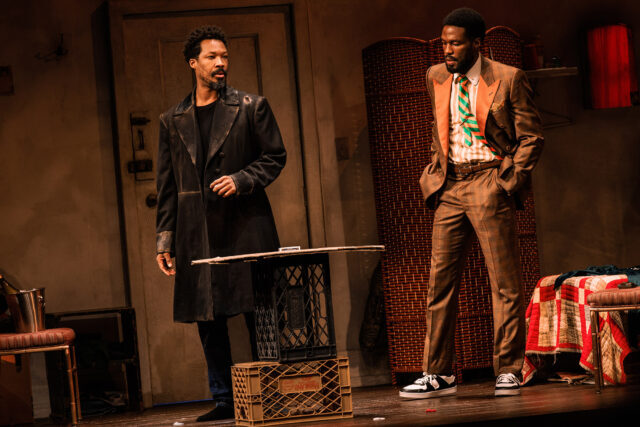
Siblings Lincoln (Corey Hawkins) and Booth (Abdul-Mateen II) face hard times in Topdog/Underdog (photo by Marc J. Franklin)
TOPDOG/UNDERDOG
Golden Theatre
336 West 20th St. between Eighth & Ninth Aves.
Tuesday – Sunday through January 15, $84-$248
topdogunderdog.com
“Theater will save the universe!” the writer, portrayed by Suzan-Lori Parks, declares in Parks’s theatrical concert Plays for the Plague Year, a sensational three-hour show that recently concluded a Covid-shortened run at Joe’s Pub. Later, she adds, “Yeah, maybe when I started I had this belief that theater would save us. But it won’t. Not in the way I thought it would. But it does preserve us, somehow.”
In honor of its twentieth anniversary, Parks’s Pulitzer Prize–winning Topdog/Underdog is being revived on Broadway at the Golden, just in time to preserve us.
Topdog/Underdog takes place in the here and now, as two brothers contemplate their fate in their cramped, tiny apartment in a rooming house. Older sibling Lincoln (Corey Hawkins), the topdog, was dumped by his wife, Cookie, and works at an arcade, where he dresses up as President Abraham Lincoln at Ford’s Theatre, slouching over and over again as patrons pay to shoot him with a fake pistol.
Booth (Abdul-Mateen II), the underdog, is a petty thief who is attempting to get back together with his ex-girlfriend, Grace, and learn how to master three-card monte, a con game in which people are duped into thinking they can pick a specific card as the dealer, aided by carefully placed accomplices, magically shuffles three cards. Lincoln was a three-card monte master, but he gave it up after one of his partners was shot and killed. Booth wants his brother to teach him, but Lincoln refuses, even though his job is in jeopardy. “They all get so into it. I do my best for them,” he says about the arcade patrons. “And now they talking bout replacing me with uh wax dummy. Itll cut costs.”
The brothers were abandoned first by their mother, who gave them each a small “inheritance,” then by their father, leaving them on their own when Lincoln was sixteen and Booth thirteen. Booth looks up to Lincoln’s three-card monte prowess and begs him to teach him to become a dealer; he doesn’t understand why Lincoln won’t help him out with the game.
They might live in squalor, but they both dream of a better life. There’s only one bed, so Lincoln sleeps in a recliner; the bathroom is down the hall, and their sink, which has no running water, is instead a storage space for Lincoln’s guitar; their phone has been turned off; and they have no table, so they use a large piece of cardboard atop milk crates to eat on. That arrangement doubles as Booth’s three-card monte table, except he angles the cardboard down for the game, as if everything is on the precipice of slipping away. (The claustrophobic set is by Arnulfo Maldonado, with costumes by Dede Ayite, lighting by Allen Lee Hughes, and sound by Justin Ellington.)

Lincoln (Corey Hawkins) and Booth (Abdul-Mateen II) consider teaming up for three-card monte in Pulitzer Prize–winning play by Suzan-Lori Parks (photo by Marc J. Franklin)
At one point Lincoln picks up his guitar and plays an improvised blues song. “My dear mother left me, my fathers gone away / My dear mother left me and my fathers gone away / I dont got no money, I dont got no place to stay. / My best girl, she threw me out into the street / My favorite horse, they ground him into meat / Im feeling cold from my head down to my feet,” he sings. “My luck was bad but now it turned to worse / My luck was bad but now it turned to worse / Dont call me up a doctor, just call me up a hearse.” The luck of the draw is an underlying theme of the show; Lincoln is adamant that three-card monte has nothing to do with luck but only skill, and when he celebrates a little victory, he goes to a bar named Lucky’s.
It all leads to a shocking ending that will echo in your head long after the show is over.
Topdog/Underdog pulsates with an electrifying energy as a cloud of doom hovers over the proceedings. Parks’s (Fucking A, The Death of the Last Black Man in the Whole Entire World AKA the Negro Book of the Dead) dialogue is pure poetry as she explores the Black experience in America from slavery to the present day, every sentence loaded with significance as it challenges stereotypes and selective history. The play reestablishes itself as part of the pantheon of outstanding works about two siblings at odds, along with such plays as Sam Shepard’s True West, Lyle Kessler’s Orphans, and August Wilson’s The Piano Lesson.
Tony winner Kenny Leon (A Raisin in the Sun, A Soldier’s Play) directs the play like a modern-dance choreographer, with nary a stray movement and gesture. Tony nominee Hawkins (In the Heights, Six Degrees of Separation) and Emmy winner Abdul-Mateen II (Watchmen, Candyman) are a formidable duo in roles originated by Jeffrey Wright and Don Cheadle at the Public in July 2001 (and on Broadway in April 2002). In his Broadway debut, Abdul-Mateen II portrays Booth with an edginess and a false bravado, his relationship with the world off kilter, while Hawkins offers up a Lincoln who is exhausted but unwilling to give up as he tries desperately to go straight.
In Plays for the Plague Year, the writer points out that she celebrates January 6 as Topdog Day, when she began writing Topdog/Underdog, but now it will go down in history as the date that MAGA rioters stormed the Capitol. Shows like Topdog/Underdog might not save us from such horrific events, but they do extend life preservers that help us survive them. “‘Does thuh show stop when no ones watching or does thuh show go on?’” Lincoln recalls one of his customers asking. The show must always go on.